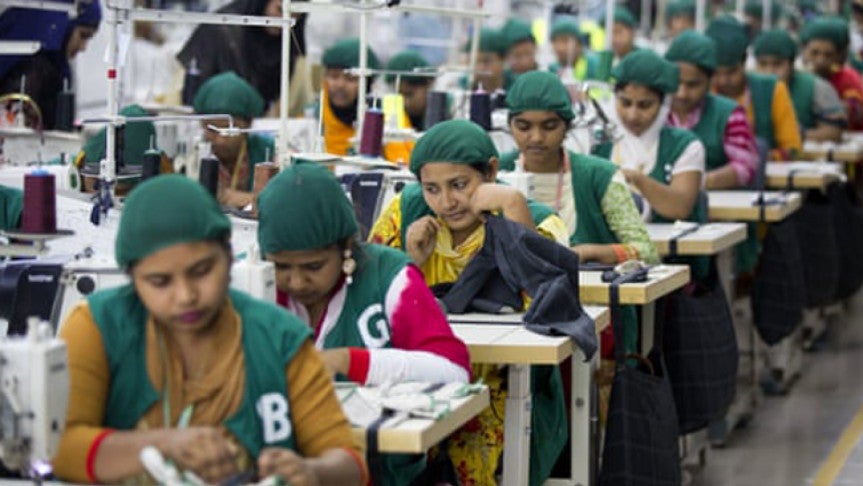BD to eject safety inspectors brought in after Rana Plaza disaster

An international inspection regime put in place after the collapse of a Bangladesh garment factory killed more than 1,100 people will be forced to leave the country on Friday, with activists warning of ‘profound and lasting’ consequences for worker safety.
A restraining order imposed by the Bangladesh high court will come into force on 30 November, forcing the Accord for Fire and Building Safety in Bangladesh to close its Dhaka office, limiting its ability to inspect thousands of factories supplying clothes for brands including H&M, Esprit and Primark, reports The Guardian.
The European parliament has expressed ‘serious concern’ at the prospect of the Accord being ejected from Bangladesh, with around 1,450 factories covered by the initiative still in need of urgent safety upgrades – including more than half without adequate fire alarm systems.
Both Esprit and H&M have said the closure of the Accord’s Dhaka office would be premature. ‘Rather than making the work easier [it] would make our jobs more difficult,’ Esprit said in a letter to its Bangladeshi suppliers.
‘If the Bangladesh government is reckless enough to close the Accord’s Dhaka office, the damage to the country’s garment industry will be profound and lasting,’ said Scott Nova, the executive director of the Worker Rights Consortium, an independent labour group.
The Accord is one of the two major international safety agreements that were established after the collapse of the Rana Plaza complex on the outskirts of Dhaka in April 2013. An estimated 1,134 workers were killed in the deadliest manufacturing accident ever. Unions called it a ‘mass industrial homicide’.
Along with the second agreement, the Alliance for Bangladesh Worker Safety, the Accord has overseen dramatic safety improvements in more than 2,300 of Bangladesh’s garment factories, identifying and helping to fix more well over 100,000 safety issues in the past five years.
Though around half the factories that make up $29bn industry are not covered by either agreement, deaths across the sector have fallen in the past five years from about 71 per year to 17, according to research from New York University’s Stern Centre.
The initial five-year terms of the two safety regimes expired this year. The Accord negotiated an extension to 2021, but was ordered by the Bangladesh high court to cease operations by the end of November over concerns it was not undergoing sufficient government scrutiny.
Rob Wayss, the executive director of the Accord, said he was ‘guardedly optimistic’ the Bangladesh government would ask the high court to allow it stay in the country. ‘We’re hopeful but not certain the government will make a submission to the court,’ he said.
If the Accord is forced to leave on Friday, it would have to continue monitoring factories by pairing with international engineering firms to send inspectors in and out of the country – significantly slowing and limiting the scope of work that is already years behind schedule.
The Bangladesh government has been pushing to be allowed to take over the inspection of the around 1,650 factories covered by the Accord.
The government says its industry has now become safer than those of its competitors in Vietnam, China and India, and control must be handed back. ‘We are a self-respecting nation,’ the Bangladesh commerce minister, Tofail Ahmed, said earlier this year. ‘There’s no more need for the Accord-Alliance.’
But technical experts, as well as some major brands, say it is far from ready to do so. ‘The government, with the support of the ILO and others, has been building up its capacity for some time, but it would still be a challenge to take over the extra number of factories in such a short period of time,’ said Tuomo Poutiainen, the ILO’s director in Bangladesh. ‘It would not be in the interests of the industry for that to happen.’
Activist groups have questioned if the government can ever adequately inspect the factories, citing the fact many garment manufacturers also sit in parliament, and that the industry makes up 82% of the country’s exports and therefore wields extraordinary clout.
‘The government of Bangladesh has failed to provide any evidence that domestic institutions have the technical capacity and the political will to perform inspections and ensure remediation,’ said Christie Miedema, a spokeswoman for the Clean Clothes campaign, an alliance of labour unions and NGOs.
Brands have raised concerns the closure of the Accord’s local office could spark protests and activism in the west that would taint their Bangladesh operations.
‘Activism in key market countries could make the Bangladesh brand toxic to consumers in spite of the tremendous improvements that we have achieved in recent years,’ wrote Luis Gonzaga, Esprit’s head of global supply, in the letter to suppliers.
He also flagged the 180 brands who are signed up the Accord would come under pressure to withdraw business from factories who have failed to undertake sufficient safety repairs. ‘The uncertainty involved would be bad for everyone,’ he wrote.
But Rubana Huq, whose Mohammadi Group is one of the country’s largest manufacturers, told the Guardian she thought it was unlikely any brands would leave the country over the decision, at least in the short term.
‘Since Bangladesh is now the only manufacturing hub that offers brands a much higher degree of [safety] compliance, sourcing from Bangladesh will go on,’ she said. ‘No brand which sources substantially from Bangladesh can afford to shift quantities overnight.’

 NTV Online
NTV Online




